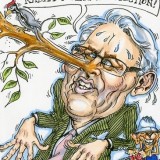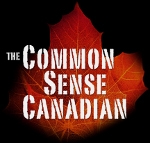From my present vantage point a very long way from home the news briefs and emails I receive are very disturbing. It seems pretty clear that the next premier will bear no scars from his/her involvement with the Campbell administration. Indeed, it almost seems as if the media are already looking back at the Campbell times with a melancholy longing for those great days.
One expects that sort of rubbish from the Liberal Party itself, but from the media?
In due course, before the new leader is nominated, there will be a big banquet for Campbell as if he deserved honour instead of contempt. He will be the man that brought the economy back from those bad old days of socialism and marshaled our resources, blah, blah, blah…
As has been well said, one is entitled to one’s own opinion but not to one’s own set of facts.
Let me try using the truth, leaving the benefits of policy open to everyone’s own opinion. I say to you, however, that on four material issues – issues that go, as the lawyers say, to the root of the matter – the government, either through ministers or the Premier himself, lied. I know that’s a harsh word but how else can one describe falsehoods in the face of clear evidence to the contrary?
Let’s start with BC Rail. The lies are firmly on the record. Campbell, in the 1996 election, to try and save his electoral bacon, promised not to privatize BC Rail. He made the same solemn vow when he was elected in 2000. Not only did he lie, the deal does not, to say the very least, pass the smell test.
Now let’s look at the Campbell lies during the 2009 election about the financial affairs of the province. By almost every reckoning the figure is much higher, but out of caution, the difference in the state of affairs between the 2009 budget and the reality was at least $1 billion and both his toady Finance Minister, Colin Hansen, and the Premier stated that they didn’t have any idea that such was the real state of the province’s finances during the election when they were telling the voters that they were superb trustees of the public purse. This is as impossible to believe as any little boy who’s stolen a candy bar and, with chocolate all over his face, denies it. If the Deputy Finance Minister and his crew of able economists did not know by the time of the 2009 budget that the province was in trouble big time they should all have been sacked. Never mind the subtleties, a look at tax figures, which are readily available on a current basis, would have set alarm bells ringing. I know that from personal experience when my colleague, Finance Minister Hugh Curtis, correctly predicted a year or more in advance the recession of the early 1980s and demonstrated to Cabinet the evidence, which was not rocket science.
The lies by toady Hansen and Pinocchio Campbell on the HST scarcely need repeating. The evidence that they had decided to implement the HST long before they were denying it on the hustings is blatant.
Campbell and Hansen have also lied through their teeth on the broad issues of energy and the environment. I think one reason these bastards are getting away with it is because the series of falsehoods is so egregiously corrupt that normal people have trouble believing it.
Many environmentalists, closer to issues than I, have spoken out on the assault on the Agricultural Land Reserve, the desecration of wilderness, and consequent massive assaults on the atmosphere. Donna Passmore has been tireless and we can only thank providence that she and others like her have their health and dedication.
Rex Weyler, one of the most respected environmentalists on earth is leading a fight against Tar Sands Oil being piped to our South Coast into supertankers. A punctured pipeline or wrecked tankers are not acceptable “risks” – they’re not “risks” at all, in fact, but mathematical certainties. Rex has the full support of The Common Sense Canadian on this front. Our allies on the North and Central Coast, such as the tireless Ian McAllister, are waging a similar battle against the proposed Enbridge Northern Gateway Pipeline from the Tar Sands to Kitimat.
I have no idea how Alexandra Morton keeps going as she fights huge international corporations, both senior governments and an industry that spends millions on sugar-coated lies as she carries on her fight to save our precious salmon from destruction from the impacts of lice and disease infected fish farms. We at The Common Sense Canadian have fought shoulder to shoulder with Alex and the fight goes on.
How to begin the defence of our rivers and the saving of BC Hydro?
Colin Hansen is a good place to start. A particularly telling interview of his is still online.
This is the senior cabinet minister we’re dealing with and every statement he makes in this 1:51 interview is false – I would accuse him of lying but I don’t want to deprive him of the defence of being a damned, easily led fool.
He tells us BC is a net importer of power – we aren’t. Sometimes BC Hydro imports power from its neighbours in Alberta and Washington State, only to sell it back to them at a profit soon thereafter. The fact is that BC is as a rule a net exporter of power. Hansen claims private power plants are little operations that don’t impede the flow the river – it’s “run of the river”. I’m tempted to call this one as it is, a goddamned lie!
These are small sort of Mom and Pop undertakings! Right, Colin, like General Electric, Ledcor and the Dupont family!
This private power will help BC be energy self-sufficient. Honestly, folks, it’s getting very hard to keep my pledge! The short answer to this is that private power is for the most part generated during the Spring run-off when there is sufficient water for them to produce. This is precisely the time BC Hydro doesn’t need power yet they must take it anyway under the agreements they’ve been forced to sign.
Here’s the skinny. BC Hydro must take private power on a “take or pay” basis, meaning it must pay for power it doesn’t need. Now here comes the neat part – the price BC Hydro must pay is 2-3 times what it can export it for! Or about 12 times what it costs them to make it themselves!
I must move on but here’s a little cherry for your martini. Traditionally BC Hydro has paid a dividend to our government to build hospitals, schools and so on. Now they will have no profit so no dividend because all the profits are going to large corporations. Now, even of you still believe the Campbell/Hansen bullshit – try this. BC Hydro has applied for a rate increase, out of your hides so they can give some of it back to you by way of that dividend!
Why has all this happened? God knows – so does Wendy! – how often I’ve asked myself that question. It’s sheer madness! No man or government would do this to their province, would they?
Only one answer makes sense – political philosophy can account for this. This is Milton Friedman stuff. It’s Fraser Institute holy writ! (Fazil Milhar, former senior fellow of The Fraser Institute is the Editor of the editorial page of the Vancouver Sun, which may help us understand the media’s role in this).
It’s Bilderberger, Davos stuff. It’s the New Order, Corporate World. It has nothing whatever to do with the good of the people. The same people bundling sub-prime mortgages, going broke, taking government handouts then paying themselves million dollar bonuses are running things all over the world.
Re-read or read for the first time Thomas Friedman’s The Lexus and the Olive Tree which explains what has happened and did it before it happened.
We have only one chance left – we must throw this government out at the earliest opportunity! No ifs, ands, or buts – this rotten bunch has to go.
It will be tough because they have a strategy – don’t answer any questions by The Common Sense Canadian, Donna Passmore, Rex Weyler, Alex Morton, The Wilderness Committee. Ignore them as if they didn’t exist! Fight the next election on other issues and remember that the folks in the media who used to ask tough questions aren’t asking them any more. Read Vaughn Palmer, Mike Smyth, listen to Bill Good or Christy Clark and tell me when over the past decade any of them covering BC affairs as an editorialist have truly held the government’s feet to the fire on the issues I’ve raised here.
There are only two answers – either all the fighters I’ve mentioned are full of crap, or the fix is in.
The next British Columbia electorate will decide, and for a very long time, whether the province is to be run by corrupt corporate boards with a bought-and-paid-for government or by us.




